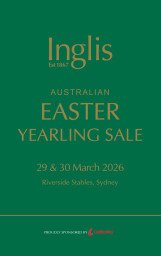###What is Horse Syndication?

Horse syndication involves the process of selling shares in a racehorse such that ownership of the horse is split between two or more part-owners. The syndicator has the responsibility for selecting the horse, finding the owners and finalizing the paperwork required for registration or transfer of ownership. Therefore, one of the advantages of buying into a syndicate is having all the hard work done for you..
As of April 2003, racehorse syndication is strictly governed by the Australian Securities and Investments Commission (ASIC). Syndicators who have met ASIC requirements are granted an Australian Financial Services (AFS) Licence. Only Licensed Syndicators are allowed to list on the Inglis Sharemarket.
###How does the Sharemarket Work?

The Inglis Sharemarket is a free service that Inglis offers to all registered syndicators. This service allows you to browse through a number of horses that are for sale and compare each horse and contact the syndicator directly via email to register your interest.
Outside of a listing fee for horses that are not sold at Inglis yearling sales, Inglis receive no compensation for any sale of any share in the listed horses. If there are questions that you have that are outside the scope of the answers supplied in this section, please feel free to contact our bloodstock team on (02) 9399 7999 but please be aware that the Inglis representative cannot advise you to take a share in one horse over another.
###What is the difference between a partnership and a syndicate ?

A partnership consists of two to ten people who register a share in a horse in their own name. Their name will appear in the race book, i.e. Mr J Blow, Mr H. Finn etc. The first named person is the manager and responsible for the administration. In most cases, a registered owner will receive two tickets to the members section of the race track and two parade ring passes. A syndicate is a group of people registered with the authorities under a syndicate name, i.e. "Inglis Thoroughbreds Syndicate" which can be one person up to a maximum of twenty. The syndicate manager is then responsible for all administration of the horse. In most cases a limit of twenty member's tickets applies to the horse and guest passes are not available.
###What does the Initial Share price cover?

The purchase price of a thoroughbred racehorse can vary widely from a few hundred dollars to a million dollars or more. The initial share price comprises several components. These include but are not restricted to:
Generally speaking, a share in syndicated horse will cost between $5,000 to $20,000 + GST / share. An average share price is usually around $10,000 + GST, although this is an estimate only.
###Ongoing Management

Racehorse syndicators can vary in their management fees. Some syndicators are very much "hands off". Once the horse has been syndicated they let the newly formed syndicate make the management decisions after talking to the trainer themselves. They allow all bills to be sent directly from the supplier (trainer, vet, etc) to you and for you to pay the trainer, etc directly and they do not charge an ongoing management fee.
Other syndicators are more involved on a day to day basis and charge a monthly management fee that manages all aspects of your investment including looking after your horse's welfare, paying of bills, communicating with key personnel, arranging stable visits, as well as organisation of open days and race day arrangements. It should be noted that the standard monthly fee usually does not include major race nomination and acceptance fees and major vet work (eg. major race injuries etc.) which must be considered as non-standard fees. These are generally much higher than standard race-related charges. Inglis suggest that you contact the syndicator who is selling a horse that you are interested in to see what their ongoing management costs are.
###What are the ongoing training costs involved ?
In the event that the syndicator does not charge a management fee and all bills are sent from each supplier, you are going to be looking at a cost of approximately $30,000 per year. Therefore a 10% share is around $300-350 per month.
Typically, such costs are comprised of:
By electing to race in a syndicate, you are sharing the above costs according to your percentage of ownership as well as the prizemoney, etc.
###Should I insure my share?

Most, if not all syndicators, insure their horses for mortality from the time of purchase up to the time of syndication and sometimes (not always) this is built into the cost of the share. It is something worth checking on.
Once the horse comes up for renewal partners are generally extended an invitation to re-insure. All subsequent invoices and payments are handled directly between the insurance company and the owner. Inglis offer very competitive insurance rates for racehorses. If you are interested in having Inglis quote for the insurance of your horse please [click here](mailto:nicola@inglis.com.au?subject=Insurance Quote&cc=byron@inglis.com.au)
Inglis strongly recommend that all owners take out mortality insurance for a minimum period of two years (annual premiums) from the time of syndication. This is because the early stages of a horse's preparation are the time when is at most risk of injury causing death due to its relative immaturity and inexperience. After this time, the decision to continue coverage on an annual basis will generally depend on how well the horse is performing.
###What are the Risks?

Horse racing is highly speculative. Not all horses that race will win, place or even earn any prize money. Whilst it is the purpose to race for a financial return, no guarantee from any syndicator or any party can be made that your horse will race and be successful on the track or will even make the track. Your racehorse may be injured on the track or even in the paddock and require long periods of recuperation. Your horse may even break down never to race again.
###Who names the horse and what names are allowed ?
In most cases, all the owners suggest a name and a vote is taken with majority rules. The availability is checked with the Registrar of Racehorses and a maximum of twenty characters, including spaces, is allowed.
###What are owner privileges on race day ?
Owners will receive complimentary Member's entry tickets and parade ring passes for your race. Partnerships receive two tickets per registered owner, syndicates receive maximum 20 tickets per horse.
###What prize money do I receive ?

The regulations of the racing industry provide for both trainers and jockeys to receive a share of all prize money earned. Trainers receive 10% and jockeys receive 5% and this is deducted prior to payment to respective owners. Other deductions are negotiated between trainers and owners by agreement, such as stable fees for bonus payments to the foreman and strappers. It is also the practice of the industry for trainers and jockeys to receive an additional share of prize money for Group race successes.
###Disclaimer
Inglis does not accept liability for the contents of any Product Disclosure Statement contained within the Inglis Sharemarket. It is the responsibility of the Promoter to comply with the requirements of an Australian Financial Services License issued by the Australian Securities & Investments Commission
-thumb.jpg)
1, 2, 3 March 2026

29, 30 March 2026

20-25 February 2026

19 April 2026